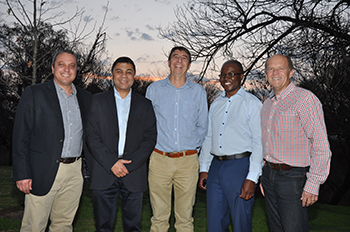Latest News Archive
Please select Category, Year, and then Month to display items
12 January 2024
|
Story Nonsindiswe Qwabe
|
Photo Sonia Small
 Since joining the UFS in 2008, Dr Grey Magaiza has worked extensively on approaches that can foster the socio-economic transformation of societies.
Since joining the UFS in 2008, Dr Grey Magaiza has worked extensively on approaches that can foster the socio-economic transformation of societies.
“The future should be one where communities can decide on their development agenda and futures. That’s the most important for me.” Dr Grey Magaiza, Deputy Director of the Centre for Gender and Africa Studies (CGAS) and Head of the Community Development programme on the Qwaqwa Campus, is passionate about capacitating communities to be agents of change and advancement. His vision for the future emphasises the empowerment of communities to take charge of their development by actively participating in decision making and the implementation of development projects that can improve their lives.
Since joining the UFS in 2008, Dr Magaiza has worked extensively on approaches that can foster the socio-economic transformation of societies. Over the years, he has crafted his research speciality into one that he is most proud of – being an interdisciplinary scientist immersed in the development of communities.
“I’m in a fortunate position of researching what I like. I say ‘fortunate’, because I’ve taken the time to understand what I’m passionate about, which is the overall field of rural livelihoods and livelihood futures – in short, community development. My research starts from an engaged university, understanding the elements that a university must use to enhance transformation and relevance to its immediate community in terms of development.”
One of the ways he has done this is by looking at social entrepreneurship as a development approach for young people in a rural setting. Through workshops with non-profit and civic organisations in Qwaqwa, Dr Magaiza has been helping these organisations to map out their needs and actively meet them through the involvement and support of external role players.
“We understand that communities are part of the national development agenda, but even that national agenda respects community knowledge and intentions and allows communities to shape their identity. A critical enabler of this is community organising. You bring back the capacity in communities to have dialogues on issues affecting them as spaces for engagement, knowledge exchange, and for people to just talk about their way forward.”
By enabling communities to define their development agenda, they can address their specific needs, challenges, and aspirations, he said. “When I look at livelihood futures, it’s quite an exciting aspect of my work – it’s like looking into a fortune tellers’ globe, because you’re not deciding for communities what they should do, but the communities themselves take those decisions.”
UFS hosts the 2017 SAIMS Conference
2017-09-21

The hosts of the 2017 SAIMS conference:
Dr Jacques Nel
(UFS:Business Management), Prof Francis Petersen
(UFS Rector and Vice-Chancellor),
Dr Werner Vermeulen (HOD of UFS: Business Management),
Dr Habofanwe Koloba (UFS: Business Management),
and Prof Hendri Kroukamp
(UFS: Dean of Economic and Management Sciences).
Photo: Supplied
The University of the Free State’s (UFS) Department of Business Management recently hosted the 29th South African Institute of Management Scientists (SAIMS) conference at Kopano Nokeng in Bloemfontein. This year’s theme, ‘Management Research: Science Serving Practice’ focused on the importance of sharing our results and making it relevant and usable to different communities.
Prof Petersen motivates researchers to become part of the business cycle
On the first day of the conference, the Rector and Vice-Chancellor of the UFS, Prof Francis Peterson, welcomed 148 delegates from 18 different institutions (academic and professional) to the City of Roses. He motivated them to keep on doing highly scholarly research by being part of the business cycles.
Prof Adré Schreuder, founder of Consulta (Pty) Ltd, was the keynote speaker of the conference. He highlighted four personas needed to further enhance and develop the science-practice alignment in market research and business. “The first skills persona is called a Social Media Maven, which is in line with the rapid growth of social media networks and the growing need for social media analytics. Then there is the Data Synthesiser that supports the growth trend in Big Data and Advanced analytics, which are both driven by technological innovation and the enormous volume of available data. The third one is Marketing Strategist, which has strong representation in brand and advertising research in our industry. Lastly, we have the ‘Business Consultant’ which aligns with the industry trends towards deeper insights and consultative skills required to move beyond mere reporting, but rather getting involved in the design and implementation of recommendations.”
Conference to collaborate academics and business
Dr Werner Vermeulen, SAIMS 2017 Conference Chair, says, “This conference will underpin the need for collaboration and cooperation of individuals from the academic environment and the business world itself.” He says the conference will also provide a wonderful forum to refresh knowledge and explore contemporary trends and future-based business research.
Delegates were also given the opportunity to dress up to the carnival theme and were entertained by a fire dancer and magician. They had the honour of indulging in two Kovsie-produced food products, the St Dairy organic cheese and exotic mushrooms by Mushroom House.